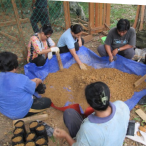English · Español

20 de febrero de 2017 | Noticias | Agua | Agroecología | Anti-neoliberalismo | Bosques y biodiversidad | Derechos humanos | Género | Soberanía Alimentaria
Capacity building on agroecology in Malaysia: the experience in Marudi, Sarawak State
Descargar: MP3 (3.7 MB)
In Malaysia, as in many other countries of the Global South, the green revolution and intensive agriculture with high levels of external input use has left as a result degraded lands, polluted waters, more risks of crop pests, agrotoxic residues in food, among other things.
In addition, this situation has brought about serious threats to the health of farmers, their families, cattle and consumers.
SAM - Friends of the Earth Malaysia, is working around the promotion of low-cost production methods, free from chemical inputs and sustainable. It is part of projects focused on composting, vegetable and herb production, projects for the reintroduction of native tree species, seed banks, medicinal plant nurseries, etc. This is all part of its struggle against monoculture plantations and GMOs, through concrete practices.
The environmental organization has a capacity-building center located in Marudi, Sarawak State, in Borneo, where indigenous communities are trained around agroecology: the use of natural and traditional production methods, use of fertilizers free from chemicals, gathering of native seeds to preserve them and to be used by future generations. "This practice has rehabilitated degraded lands belonging to these communities and have brought the wildlife back", states SAM in its website.
According to information provided to Real World Radio, this organization also organized two activities in Marudi focused on the importance and need of agroecology and sustainable agricultural practices. During the activities natural fertilizers were sold (compost and vermicompost) and other agricultural products. 3000 small native trees were also distributed to farmers and in three other villages in Marudi region.
In the framework of the work carried out in Marudi we find a gender perspective. SAM promotes that women, in addition to being involved in production as they have been traditionally, should strive for economic self-sufficiency through the elaboration of products with local materials. For instance, crafts, traditional carpets, baskets, hats, among others.
There are currently seven villages with a complete land use mapping with specific information showing the community and capacity building center, individual arable lands, community reforestation/rehabilitation areas, always within their respective traditional territories. SAM´s goal is also to strengthen the organization and community work of these villages and the sustainable management of land and natural resources.
Important allies of SAM in this area of work include the Consumers´ Association of Penang (where the main offices of the environmental organization are located) and numerous Sarawak communities. The idea is to reach indigenous communities, local farmers, but also students and even government entities.
For more information read the attached file and visit their website: http://www.foe-malaysia.org/
Imagen: http://www.foe-malaysia.org/food_sovereignty








